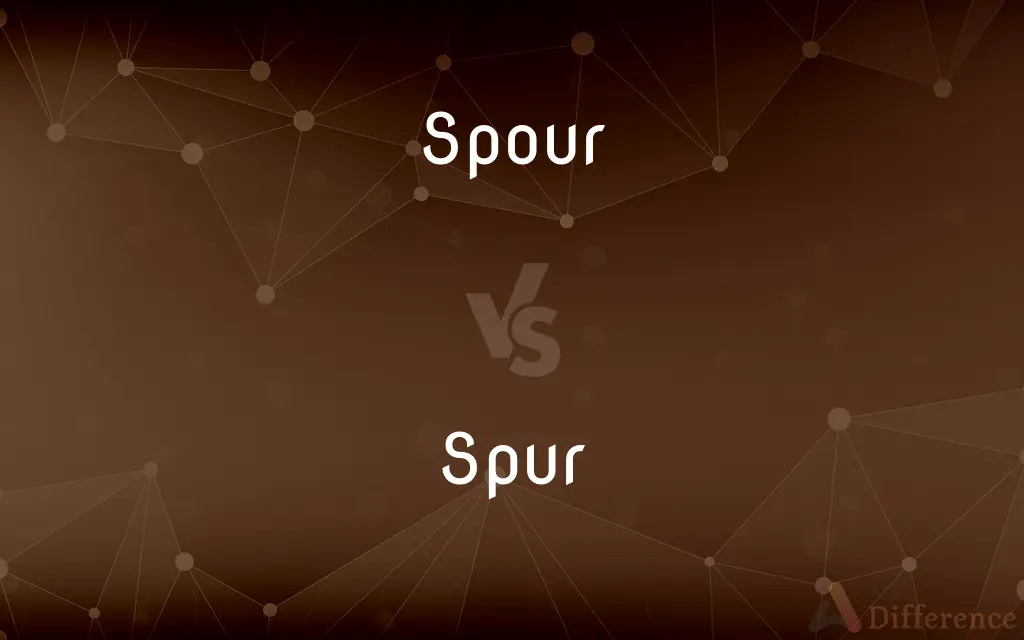Spour vs. Spur — Which is Correct Spelling?
By Tayyaba Rehman — Updated on March 29, 2024
"Spour" is an incorrect spelling, while "Spur" is the correct term. "Spur" refers to a device or stimulus urging action or greater effort.

Table of Contents
Which is correct: Spour or Spur
How to spell Spur?

Spour
Incorrect Spelling

Spur
Correct Spelling
ADVERTISEMENT
Key Differences
Visualize a cowboy's heel spur, a sharp device used on boots.
Associate "spur" with "pure," sharing the "ur" sequence.
Recall "spur of the moment," a common phrase.
Remember, it's short and direct – just four letters, like the prompt action it denotes.
Think of "ur" as in "urge," since a spur urges action.
ADVERTISEMENT
How Do You Spell Spur Correctly?
Incorrect: The team needed a spour to finish their project on time.
Correct: The team needed a spur to finish their project on time.
Incorrect: She used positive feedback as a spour to motivate her students.
Correct: She used positive feedback as a spur to motivate her students.
Incorrect: The reward served as a spour for employees to work harder.
Correct: The reward served as a spur for employees to work harder.
Incorrect: The lack of resources was a spour to find creative solutions.
Correct: The lack of resources was a spur to find creative solutions.
Incorrect: His innovative ideas were a spour for new research in the field.
Correct: His innovative ideas were a spur for new research in the field.
Spur Definitions
Spur refers to something that prompts or encourages an action.
The prize money was a spur for the competitors.
Spur can also be a projection or offshoot, especially of a mountain or hill.
They hiked over the spur to reach the main trail.
A short spike or spiked wheel that attaches to the heel of a rider's boot and is used to urge a horse forward.
An incentive
A spur to action.
A spinelike process on the leg of some birds.
A climbing iron; a crampon.
A gaff attached to the leg of a gamecock.
A short or stunted branch of a tree.
A bony outgrowth or protuberance.
A lateral ridge projecting from a mountain or mountain range.
An oblique reinforcing prop or stay of timber or masonry.
(Botany) A tubular or saclike extension of the corolla or calyx of a flower, as in a columbine or larkspur.
An ergot growing on rye.
A spur track.
To urge (a horse) on by the use of spurs.
To incite or stimulate
"A business tax cut is needed to spur industrial investment" (New York Times).
To ride quickly by spurring a horse.
A rigid implement, often roughly y-shaped, that is fixed to one's heel for the purpose of prodding a horse. Often worn by, and emblematic of, the cowboy or the knight.
A jab given with the spurs.
(figurative) Anything that inspires or motivates, as a spur does a horse.
An appendage or spike pointing rearward, near the foot, for instance that of a rooster.
Any protruding part connected at one end, for instance a highway that extends from another highway into a city.
Roots, tree roots.
(geology) A mountain that shoots from another mountain or range and extends some distance in a lateral direction, or at right angles.
A spiked iron worn by seamen upon the bottom of the boot, to enable them to stand upon the carcass of a whale to strip off the blubber.
(carpentry) A brace strengthening a post and some connected part, such as a rafter or crossbeam; a strut.
(architecture) The short wooden buttress of a post.
(architecture) A projection from the round base of a column, occupying the angle of a square plinth upon which the base rests, or bringing the bottom bed of the base to a nearly square form. It is generally carved in leafage.
Ergotized rye or other grain.
A wall in a fortification that crosses a part of a rampart and joins to an inner wall.
(shipbuilding) A piece of timber fixed on the bilgeways before launching, having the upper ends bolted to the vessel's side.
(shipbuilding) A curved piece of timber serving as a half to support the deck where a whole beam cannot be placed.
(mining) A branch of a vein.
(rail transport) A very short branch line of a railway line.
(transport) A short branch road of a motorway, freeway or major road.
(botany) A short thin side shoot from a branch, especially one that bears fruit or, in conifers, the shoots that bear the leaves.
A tern.
(electronics) A spurious tone, one that interferes with a signal in a circuit and is often masked underneath that signal.
(transitive) To prod (especially a horse) on the side or flank, with the intent to urge motion or haste, to gig.
(transitive) To urge or encourage to action, or to a more vigorous pursuit of an object
(transitive) To put spurs on.
To spur boots
(intransitive) To press forward; to travel in great haste.
To form a spur senses 17-18 of the noun
A sparrow.
An implement secured to the heel, or above the heel, of a horseman, to urge the horse by its pressure. Modern spurs have a small wheel, or rowel, with short points. Spurs were the badge of knighthood.
And on her feet a pair of spurs large.
That which goads to action; an incitement.
Fame is the spur that the clear spirit doth raise(That last infirmity of noble mind)To scorn delights and live laborious days.
Something that projects; a snag.
One of the large or principal roots of a tree.
Any stiff, sharp spine, as on the wings and legs of certain birds, on the legs of insects, etc.; especially, the spine on a cock's leg.
A mountain that shoots from any other mountain, or range of mountains, and extends to some distance in a lateral direction, or at right angles.
A spiked iron worn by seamen upon the bottom of the boot, to enable them to stand upon the carcass of a whale, to strip off the blubber.
A brace strengthening a post and some connected part, as a rafter or crossbeam; a strut.
The short wooden buttress of a post.
Any projecting appendage of a flower looking like a spur.
A wall that crosses a part of a rampart and joins to an inner wall.
A piece of timber fixed on the bilge ways before launching, having the upper ends bolted to the vessel's side.
A branch of a vein.
The track of an animal, as an otter; a spoor.
To prick with spurs; to incite to a more hasty pace; to urge or goad; as, to spur a horse.
To urge or encourage to action, or to a more vigorous pursuit of an object; to incite; to stimulate; to instigate; to impel; to drive.
Love will not be spurred to what it loathes.
To put spurs on; as, a spurred boot.
To spur on one's horse; to travel with great expedition; to hasten; hence, to press forward in any pursuit.
The Parthians shall be there,And, spurring from the fight, confess their fear.
The roads leading to the capital were covered with multitudes of yeomen, spurring hard to Westminster.
Some bold men, . . . by spurring on, refine themselves.
A verbalization that encourages you to attempt something;
The ceaseless prodding got on his nerves
Any pointed projection
Tubular extension at the base of the corolla in some flowers
A sharp prod fixed to a rider's heel and used to urge a horse onward;
Cowboys know not to squat with their spurs on
A railway line connected to a trunk line
Incite or stimulate;
The Academy was formed to spur research
Give heart or courage to
Strike with a spur
Goad with spurs;
The rider spurred his horse
Equip with spurs;
Spur horses
Spur is a pointed device attached to a rider's heel for urging a horse forward.
He gently used the spur to make the horse trot faster.
Spur signifies a sudden or impulsive action or decision.
On the spur of the moment, they decided to go on a road trip.
Spur in verb form means to encourage or stimulate into action.
The coach spurred the team on with an inspirational speech.
Spur Meaning in a Sentence
Personal goals can be a powerful spur to achieve success.
A friendly competition among friends acted as a spur to improve their skills.
The inspiring speech served as a spur for the community to come together.
Historical events often act as a spur for change in society.
The promise of a bonus was a spur for the sales team's efforts.
The possibility of winning a scholarship was a spur to study harder.
Economic development can serve as a spur for technological innovation.
Feedback from customers can be a spur for improving service quality.
Artistic expression can be a spur for social commentary.
The discovery of new information can be a spur for scientific exploration.
Personal tragedy can act as a spur for advocacy and change.
A significant achievement can serve as a spur for further accomplishments.
The need for environmental protection has been a spur for sustainable practices.
The desire to be healthy can be a spur to exercise regularly.
Social media has been a spur for political activism.
The need for innovation is a spur for research and development.
Travel experiences can serve as a spur for cultural appreciation.
Challenges in life can serve as a spur to personal growth.
A crisis often serves as a spur for action.
The love of learning can be a spur to pursue education.
The search for a cure has been a spur for medical research.
The fear of failure can act as a spur to work harder.
A good leader serves as a spur for their team's motivation.
The invention of the internet was a spur for global communication.
Common Curiosities
Which vowel is used before Spur?
The article "a" is typically used before "spur."
What is the singular form of Spur?
The singular form is "spur."
Is Spur an abstract noun?
No, "spur" is a concrete noun, but its figurative sense can be abstract.
What is the verb form of Spur?
The verb form is "to spur," meaning to urge or stimulate into action.
What is the pronunciation of Spur?
It is pronounced as /spɜr/.
What is the plural form of Spur?
The plural form is "spurs."
Why is it called Spur?
The term "Spur" originates from Old English "spura" or "spora," referring to a device used to urge a horse forward.
Which preposition is used with Spur?
Prepositions like "on" (as in "spur on") or "of" (as in "spur of the moment") can be used with "spur."
What is the root word of Spur?
The root word is Old English "spura" or "spora."
Is Spur a vowel or consonant?
"Spur" is a word containing both vowels and consonants.
Which conjunction is used with Spur?
Any conjunction can be used, like "and" or "but," depending on the sentence.
Is Spur a noun or adjective?
"Spur" is primarily a noun but can also be used as a verb.
What is a stressed syllable in Spur?
The entire word "spur" is stressed as it's monosyllabic.
Which article is used with Spur?
Both "a" and "the" can be used with "spur."
Is Spur an adverb?
No, "spur" is not an adverb.
Is Spur a negative or positive word?
Neutral in itself; the context determines its positive or negative connotation.
Is Spur a countable noun?
Yes, "spur" is countable, e.g., "two spurs."
Is the Spur term a metaphor?
"Spur" can be used metaphorically, as in "a spur to action."
How many syllables are in Spur?
There's one syllable in "spur."
How do we divide Spur into syllables?
"Spur" is a monosyllabic word and doesn't divide into multiple syllables.
What is the opposite of Spur?
The opposite could be "deter" or "dissuade."
Is the word “Spur” a Direct object or an Indirect object?
"Spur" can be used as a direct object, e.g., "She bought a spur."
What part of speech is Spur?
"Spur" can be both a noun and a verb.
What is another term for Spur?
Another term could be "stimulus" or "goad."
What is the first form of Spur?
The first form (base form) is "spur."
Is the word Spur imperative?
No, "spur" is not in the imperative form, but its verb form can be used as a command.
Which determiner is used with Spur?
Determiners like "this," "that," or "my" can be used with "spur."
What is the third form of Spur?
The third form (past participle) is "spurred."
How is Spur used in a sentence?
"The possibility of a promotion spurred him to work harder."
Is Spur a collective noun?
No, "spur" is not a collective noun.
Is the word Spur a gerund?
No, "spurring" would be the gerund form.
What is the second form of Spur?
The second form (past simple) is "spurred."
Share Your Discovery

Previous Comparison
Miriad vs. Myriad
Next Comparison
Liason vs. LiaisonAuthor Spotlight
Written by
Tayyaba RehmanTayyaba Rehman is a distinguished writer, currently serving as a primary contributor to askdifference.com. As a researcher in semantics and etymology, Tayyaba's passion for the complexity of languages and their distinctions has found a perfect home on the platform. Tayyaba delves into the intricacies of language, distinguishing between commonly confused words and phrases, thereby providing clarity for readers worldwide.







































